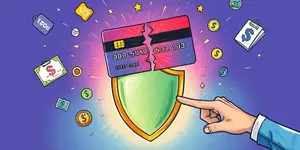
Stepping into the world of credit cards can feel like navigating uncharted territory, filled with both promise and peril. For many first-time users, questions swirl: “Will I manage payments? What if I fall into debt? How will this affect my future?” With clear guidance and a steady mindset, your inaugural card can become a powerful ally, not a source of stress.
In this comprehensive guide, we combine practical advice, up-to-date 2025 data, and psychological strategies to help you embrace your first credit card with confidence. You’ll learn how to avoid common pitfalls, leverage responsible practices, and build a strong credit history that supports major life goals.
Your first credit card is more than a spending tool—it lays the building blocks for your credit history. A solid credit history is essential when you apply for mortgages, auto loans, or rental agreements. Lenders and landlords look to your credit score as a measure of reliability, making that initial card a powerful key to unlocking future opportunities.
Beyond lending, credit cards offer independence and convenience in everyday transactions. They provide purchase protection, emergency funds, and rewards programs that can enhance your financial flexibility. When managed responsibly, they become a cornerstone of modern money management.
At its core, a credit card lets you borrow up to a set limit for purchases, balancing convenience today with repayment obligations tomorrow. Each card comes with an Annual Percentage Rate (APR)—the interest rate charged on unpaid balances. New or less-established users often face APRs near 30%, so understanding costs is crucial.
Every billing cycle, you receive a statement showing your balance, the minimum payment due, and the due date. Making only the minimum payment causes interest to compound, potentially leading to years of debt and thousands in interest charges. The math is straightforward: large balances and high APRs can turn small debts into overwhelming burdens.
Credit card debt in the U.S. remains historically high, even as delinquency rates hold steady. In Q1 2025, total outstanding credit card debt stood at $1.18 trillion, down slightly from $1.21 trillion in Q4 2024. Meanwhile, the average cardholder with unpaid balances owes $7,321, a 5.8% increase from the previous year.
Despite high debt levels, delinquency rates remain relatively low, suggesting that many Americans are managing credits wisely. Yet overspending and minimum-payment traps persist, especially among beginners drawn to available credit without disciplined planning.
New cardholders often stumble into similar traps. Recognizing these pitfalls early can save you stress and money.
Embarking on a journey of responsible credit use involves clear guidelines and consistent habits. Follow these expert tips to keep stress at bay and credit health strong.
Fraudsters constantly refine their tactics, making vigilance essential. Regularly reviewing statements and setting alerts can catch unauthorized charges quickly. Many banks now offer real-time notifications for every transaction—enable them for extra security.
If you detect fraud, contact your card issuer immediately. Under federal regulations, your liability for unauthorized charges is limited, but prompt action ensures minimal disruption to your finances and credit score.
Your credit score is influenced by multiple factors, including payment history, credit utilization, account age, and credit mix. Timely payments and low utilization are among the most significant contributors. By consistently paying in full every month and maintaining low balances across accounts, you signal reliability to lenders.
Opening a credit card adds to your credit mix and can boost your score, provided you manage the account responsibly. Over time, a history of on-time payments and sensible usage helps unlock better offers, lower interest rates, and increased credit limits.
Beyond numbers and rates, cultivating positive behaviors ensures long-term success. Start small: set monthly spending limits, track your charges in a budgeting app, and celebrate milestones like your first full payment without carrying a balance.
By embedding these practices into your routine, you’ll transform credit from a source of anxiety into a tool for growth. Each on-time payment and mindful charge builds resilience and confidence.
Remember, responsible credit use is a journey, not a destination. Mistakes may happen, but with prompt corrective actions and a learning mindset, your first credit card can be the stepping-stone to a secure financial future.
Embrace the challenge, equip yourself with knowledge, and watch as your credit history becomes a story of empowerment rather than stress.
References













